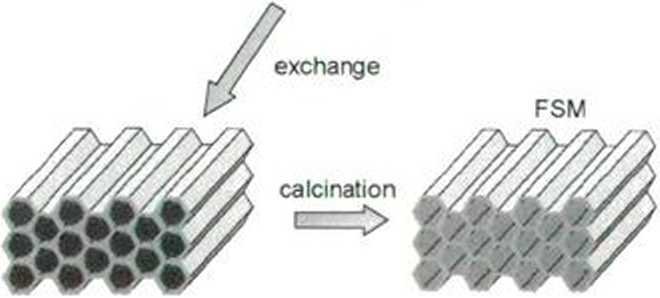9058009772
Acta Mineralogica-Petrographica, Abstract Series 4, Szeged, 2004
ALUMINATED LAYERED SILICATES AS PRECURSORS OF MESOPOROUS MOLECULAR SIEYES
MICHALIK, A.,1 WŁODARCZYK, W.,1 LEWANDOWSKA, A.,1 SERWICKA, E.,‘ GAWEŁ, A.,2 BAHRANOWSKL K.2
1 Instituic of Caialysis and Surface Chemistry PAS [Instytut Katalizy i Fizykochemii Powierzchni PAN). Niezapominajek 8. Kraków. 30 239, Poland
2 Faculty of Geology, Geophysics and Environmental Protection. University of Science and Technology [Wydział Geologii, Geofizyki i Ochrony Środowiska. Akademia Górniczno-Hutnicza], al. Mickiewicza 30, Kraków, 30 059, Poland
E-mail: bahr@uci.agh.edu.pl
kanemite

surfactant micelles

In 1993 a synthelic procedurę describing preparation of the so-called folded sheet mesoporous materials (FSM) from the synthetic minerał kanemite (Inagaki et al., 1993) has been reported. Kanemite is a layered sodium silicate, with formula NaHSi205-3IŁ0, built of negatively charged tctrahedral Silicon oxo-hvdroxy zig-zag layers intercalated with positively charged octahedral layers of hydrated sodium cations, which are susceptible to cation exchange. Exchange of sodium cations for the cationic surfactant species results in the rearrange-ments within the silica layers and formation of structures with honey-comb appearance. Removal of the surfactant template by calcination produces porous materials of unique properties: hexagonal arrangement of uniform pores whose diameter can be controlled within 2-10 nm by changing the tcmplating species, large speciftc surface area (over 7(X) m2/g), and good thermal stability (up to 1100-1200°K).
+

Fig. 1
Purely siliceous mesoporous materials do not contain active sites that would allow for their usc as efficient adsorb-ents, molecular sieves, catalysts. etc. The aim of the present work was to obtain FSM materials substituted isomorphously with aluminium, in order to generate cation cxchangc properties in the FSM materiał. The first step of the preparation procedurę involved the synthesis of a sodium silicate pre-cursor, which, upon hydration transformed into kanemite. Alumination of the materiał has been carried out at this stage, by adding A1(N03)3 to the synthesis mixture. The XRD pattems of the obtained solids pointed to the presence of several polymorphs of Na2Si205. whose re!ative content depended on the amount of Al dopant. Subsequent hydration yielded solids which, beside XRD pattern characteristic of kanemite, showed also reflections assignable to a silicie acid H2Si:0$ 7H:0. The contribution of the latter inereased with the growing amount of Al substitution. A certain amount of amorphous silica, evidenced by a broad envelope centred around d = 0.35 nm, could be found in all solids. Upon treat-ment with the cationic surfactant (HDTMA. hexadecyltri-methylammonium chloride) and subsequent calcination all materials produced FSM-like structures as demonstrated by the characteristic XRD pattems typical of a hexagonal lattice. The observed d,Ku spacings depended on the Al content and were in the rangę 3.7^Ł2 nm. Solid-state MAS NMR of 2 Al showed that in all samples Al occupied tetrahedral positions. Textural properties of the samples were determined from the nitrogen adsorption isotherm at 77°K. The BET specific surface areas w'ere in the rangę 700-1000 nr/g. The porę size distribution analysis with BJH method confirmed that all FSM materials were characterised by a uniform porę diameter. ranging from 2.4 nm for FSM without Al and with 2.5al% Al, to 2.8 nm for FSM with 5% Al.
Acknow ledgements
This work was supported by the Polish Committee for Scienti-fic Research, within the project 2-P04D-050-26 (2004-2007).
Reference
Inagaki, S., Fukushima, Y.. Kuroda, K. (1993): Chemical Communications, 680.
73
www. sci. u-szeged.hu/asvanytan/acta.htm
Wyszukiwarka
Podobne podstrony:
Acta Mineralogica-Petrographica, Abstract Series 4. Szeged. 2004THE INFLUENCE OFCATION INTERCALATINC
Acta Mineralogica-Petrographica, Abstract Series 4, Szeged, 2004SUBSTITUTION PROCESSES DURING
Acta Mineralogica-Petrographica, Abstract Series 4, Szeged, 2004MAGNETIC IDENTIFICATION OF THE MAGNE
Acta Mineralogica-Petrographica, Abstract Series 4, Szeged, 2004ORIGIN OF RED CLAYS AT THE RIGHT BAN
Acta Mineralogica-Petrographica, Abstract Series 4, Szeged, 2004CLAY MINERALOGY OF BENTONITES AND KA
Acta Mineralogica-Petrographica, Abstract Series 4, Szeged, 2004QUANTITATIVE RECONSTRUCTION OF HOLOC
Acta Mineralogica-Petrographica, Abstract Series 4, Szeged, 2004BEHAVIOUR OF DIFFERENT CATIONIC FORM
Acta Mineralogica-Petrographica, Abstract Series 4, Szeged, 2004SECONDARY M1NERALS IN THE LOWER PERM
Acta Mineralogica-Petrographica, Abstract Series 4, Szeged, 2004CLAY MINERALS IN THE JURASSIC
Acta Mineralogica-Petrographica, Abstract Series 4, Szeged, 2004EXPERIMENTALLY DETERMINED RELATIONSH
Acta Mineralogica-Petrographica, Abstract Senes 4, Szeged, 2004MINERALOGICAL AND CRYSTAL CHEMICAL AS
Acta Mineralogica-Petrographica, Abstract Senes 4, Szeged, 2004FACTORS AFFECTING THE REACTION PROGRE
więcej podobnych podstron